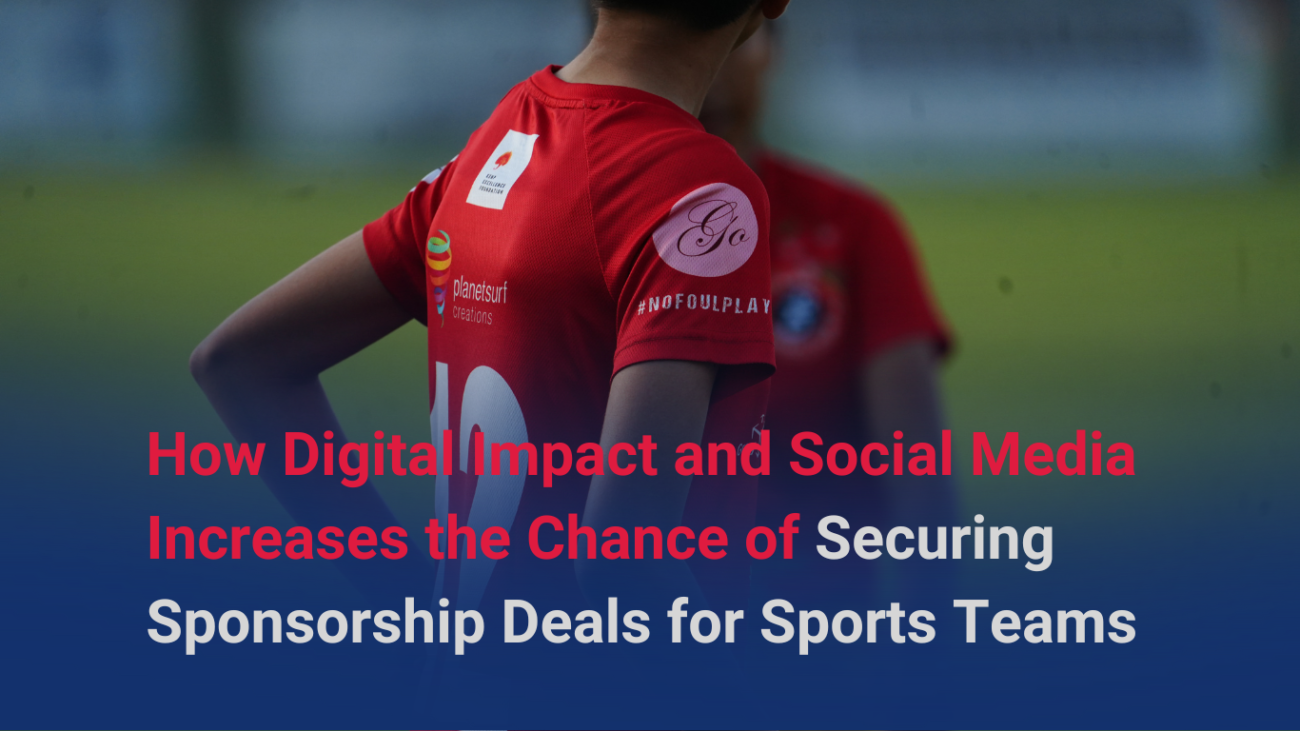In today’s digital age, sports teams have a wealth of opportunities to secure sponsorship deals. By leveraging the power of social media and other digital platforms, teams can reach a wider audience, build brand awareness, and generate revenue.
Here are some of the ways that digital impact and social media can help sports teams secure sponsorship deals:
Amplified Brand Visibility:
In the digital era, social media platforms have become crucial channels for sports teams to showcase their brand and reach a global audience. A strong online presence allows teams to share captivating content, highlights, and behind-the-scenes access, thereby increasing their visibility and fan engagement. Brands are eager to partner with teams that can deliver valuable exposure, making a compelling case for sponsorship opportunities.
Example: Manchester United, one of the most iconic football clubs, has harnessed the power of social media to build a massive following and engage fans worldwide. The club’s strong digital presence, with over 140 million followers on social platforms, has attracted sponsorship deals with renowned brands like Chevrolet and Adidas.
Targeted and Engaged Fan Base:
Social media platforms enable sports teams to connect directly with their fans, fostering a loyal and engaged community. Brands value the opportunity to tap into this passionate fan base and align their products or services with a specific demographic. By leveraging social media analytics and insights, teams can offer brands valuable data about their fan base, including demographics, interests, and online behavior, making them an attractive proposition for sponsors.
Example: The Golden State Warriors, a dominant force in the NBA, have built a strong digital presence and a devoted fan base. With over 23 million social media followers, the team’s digital platforms provide a targeted audience for sponsors seeking to engage with basketball enthusiasts. Partnerships with companies like Rakuten and Chase have flourished as a result.
Compelling Content and Storytelling:
Brands are increasingly interested in sports teams that can create engaging and shareable content. Through social media, teams can provide exclusive access, immersive storytelling, and interactive experiences, captivating their audience and extending brand exposure. By showcasing the team’s culture, values, and achievements, sports teams can forge an emotional connection with fans and sponsors alike.
Example: The Philadelphia 76ers, an NBA franchise, have excelled in content creation, capturing the attention of fans and sponsors through their engaging digital presence. Their innovative content campaigns, such as “Phila Unite” and “Trust the Process,” have contributed to securing partnerships with companies like StubHub and Toyota.
Data-driven Performance Metrics:
Brands expect sports teams to provide tangible data and analytics that demonstrate the effectiveness of their sponsorship deals. In the digital realm, teams have access to robust analytics tools, allowing them to measure metrics such as reach, impressions, engagement, and conversions. By providing comprehensive reports and insights, teams can showcase the ROI and demonstrate the value they bring to sponsors.
Example: The New York Yankees, a renowned baseball franchise, have leveraged digital analytics to measure and showcase their performance. With a fan base of over 10 million followers on social media, the team can present compelling data on audience demographics, engagement rates, and content performance, attracting sponsors like Pepsi and Mastercard.
Here are some examples of how sports teams have used digital impact and social media to secure sponsorship deals:
- In 2018, the New York Yankees partnered with Budweiser to create a custom Snapchat filter that allowed fans to virtually try on different Yankees hats. The filter was used over 1 million times, and it helped to generate awareness for Budweiser’s sponsorship of the Yankees.
- In 2019, the Los Angeles Lakers partnered with State Farm to create a series of social media videos that featured Lakers players sharing their tips for financial planning. The videos were viewed over 10 million times, and they helped to generate awareness for State Farm’s sponsorship of the Lakers.
- In 2020, the Boston Celtics partnered with Dunkin’ Donuts to create a custom coffee blend that was only available at Celtics games. The coffee blend was a hit with fans, and it helped to generate revenue for the Celtics and Dunkin’ Donuts.
These are just a few examples of how sports teams have used digital impact and social media to secure sponsorship deals. As the digital landscape continues to evolve, sports teams will need to continue to adapt their strategies in order to stay ahead of the curve.
What brands are expecting from sports teams digitally?
In addition to traditional sponsorship opportunities, brands are also expecting sports teams to deliver value digitally. This includes things like:
- Creating engaging content: Brands want sports teams to create content that is interesting and engaging for their fans. This could include things like blog posts, videos, and social media posts.
- Driving traffic to their website: Brands want sports teams to drive traffic to their website. This could be done through things like links in blog posts, social media posts, and in-stadium signage.
- Generating leads: Brands want sports teams to generate leads for their business. This could be done through things like email signups, surveys, and contests.
Statistics on the digital impact of sports teams:
The digital impact of sports teams is significant. According to a study by Nielsen, sports fans spend an average of 10 hours per week consuming sports content online. This includes watching videos, reading articles, and interacting with teams and players on social media.
The digital impact of sports teams is also growing. In the same study, Nielsen found that the number of sports fans who consume sports content online has increased by 20% in the past two years.
This growing digital impact is creating new opportunities for brands to partner with sports teams. By working with sports teams, brands can reach a wider audience, drive traffic to their website, and generate leads for their business.

